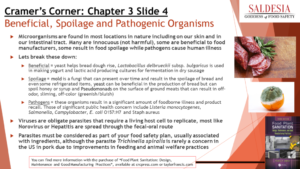Beneficial, Spoilage, and Pathogenic Organisms


In the food industry, organisms are used for making products such as bread, cheese and dry sausage. In these items, the organisms are added as an ingredient and the food is prepared under controlled temperature and humidity conditions that enhance the process; dough rising before baking, production of lactic acid for the “tang” in sausage. Nature also provides for the formation of Botrytis cinerea on grape vine roots that allow us to enjoy the unique and complex flavor of Sauterne.
The organisms that can result in spoilage or contamination are briefly explained in the slide below and in greater detail in Chapter 3 of the book Food Plant Sanitation, entitled “Microorganisms of Food Manufacturing Concern”. The information in Chapter 3 Slide 4 is provided to aid in understanding the bacteria, viruses or parasites that must be considered for you food safety plan.
Slide Content
Microorganisms are found in most locations in nature including on our skin and in our intestinal tract. Many are innocuous (not harmful), some are beneficial to food manufacturers, some result in food spoilage while pathogens cause human illness
Let’s break these down:
– Beneficial = yeast helps bread dough rise, Lactobacillus delbrueckii subsp. bulgaricus is used in making yogurt and lactic acid producing cultures for fermentation in dry sausage
– Spoilage = mold is a fungi that can present over time and result in the spoilage of bread and even some refrigerated items, yeast can be beneficial in the production of bread but can spoil honey or syrup and Pseudomonads on the surface of ground meats that result in off odor, sliming, off-color (greenish/bluish)
– Pathogens = these organisms result in a significant amount of foodborne illness and product recall. Those of significant public health concern include Listeria monocytogenes, Salmonella, Campylobacter, E. coli O157:H7 and Staph aureus
Viruses are obligate parasites that require a living host cell to replicate, most like Norovirus or Hepatitis are spread through the fecal-oral route
Parasites must be considered as part of your food safety plan, usually associated with ingredients, although the parasite Trichinella spiralis is rarely a concern in the US in pork due to improvements in feeding and animal welfare practices
